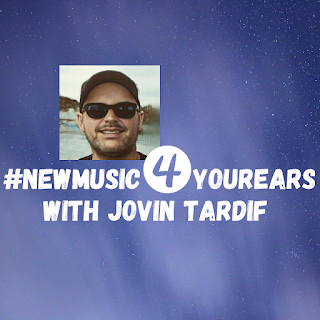Interview with Canadian musician and writer Eamon McGrath
Interview with Canadian musician and writer Eamon McGrath
Today on #whatonwhatsgood with Jovin Tardif, I am here with Eamon McGrath. Eamon is a Toronto-based, Edmonton-raised singer/songwriter. Over 15 years, he has written and recorded over 300 songs. Today in our #cinqque5tion interview, we discuss what inspired him to get into music, his new album 'Bells of Hope', touring, and much more.
His new album includes singles 'Age of Unease', 'Sarajevo', 'Cannonball', 'April' and 'Sparkle and Bleed'. McGrath will also be touring starting in March. His tour includes Calgary, Edmonton, Lethbridge, Canmore, Jasper, London, Bracebridge, Toronto, Ottawa, Hamilton, Edmonton, Longview, and Rossland.
1. What first inspired you to get into music?
"The Clash has probably had the most lasting impact on me in all honesty. I began playing guitar when I was nine and immediately started a band. Since then I have been in a band every single day of my life. It’s one of those things that sort of feels like it’s just always been there. There wasn’t ever so much a spark, it’s been more of an ever-present fire, like a friend you’ve known since birth."
2. Can you describe your creative process for your new album 'Bells of Hope’?
"The way I made Bells of Hope was the way I used to make records when I first started making records. It was a totally solitary experience: you’re the producer, performer, engineer, and writer. I played everything on Bells except drums, horns, a few bits of keys, and of course the guest singing, so there’s no one except you to tell you if it’s shit or not. Anyone else who played on the record—Julie Doiron, Miesha Louie, Cormac Culkeen—that was all recorded by them remotely, which was a totally foreign process to me. They all sent me just one or two tracks to use, it was all in their hands. Funny enough, it actually ended up being away more community-oriented experience than I’d expected it to be. Everyone was isolated and alone yet it was great to be able to still use music as something that can bring you together, despite being so distant. Everyone I asked to play on the record I also trust very deeply artistically, so there was no worry that they’d send me anything I wouldn’t end up using: I used every second of it. It was really collaborative, despite the fact that I was alone making it. And as great as the studio experience is, it was great to not be handcuffed to anybody’s schedule, money or time."
3. Do you have a favourite song from the album (Bells of Hope) and why?
"I think 'April' is the track on the record that sticks out to me the most. I’m a sucker for sad shit, call me crazy. I love a good, heartbreaking, depressing, overwhelmingly emotional piece of music, and 'April' is the closest thing on the record in my opinion to a crushingly heavy, sad song."
4. You are back on tour as of March, do you have a favorite venue and why?
"I’ve been touring for so long and I’ve been to so many places that for the most part I’m always kind of returning to venues I’m really familiar with and comfortable in, so everywhere I play ends up having this coziness to it. I love each stage in the world for wildly different reasons, and I’m so happy they all exist and continue their quest to survive. Stages are perhaps the most necessary component to an arts community besides people to put on them, so even places that you remember for technical difficulties or a weird night of the week hold a really important place in your heart. Not only does your livelihood depend on them, but they really are a magical place, and even if you’re playing in the one and only single venue in town, thank god that place has a venue there. There are some pretty spectacular rooms across the world however that stand out to me. Of course, Vera in Groningen is like playing in a dream, it completely lives up to its reputation and they have succeeded in being central to the creation of a really powerful art community in that great, great city. But I also love Folk Cafe in St. Gallen for the same reasons, and that’s literally a living room. Or Raf-Rec in Yamagata which is a bar in a record store. Or a place in Mexico City called Dirty Sound, which is sadly no longer with us: the stage was a piece of chewed-up plywood on empty beer kegs and the stage power was hanging from a dripping-wet hole in the ceiling. I saw one of the best punk rock shows I ever saw in my entire life there, especially a brutally intense power violence band called Estado. I’ve had experiences I’ll never forget all over the world in these incredible places and they’re all equally incredible in their own unique ways."
5. How do you prepare for being away from your home for an extended time period of time?
"I still have no way to feel like I’m ever actually prepared. You always feel like you’ve left something behind, or that you’re going to forget all your songs, or that a flight’s going to be delayed and you’re going to miss your first show. And then you get out there and everything is always fine, one way or another. You just have to dive in headfirst."
6. Do you have any hobbies or interests outside of music?
"I write or play music at least once a day, every day, in some form or another. If I’m fucking around by the campfire, I guess that’s when music is my hobby. When you’re playing in front of 800 people, I guess at that moment it’s your job. But every single road I end up on leads me to songs."


Comments
Post a Comment